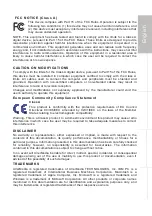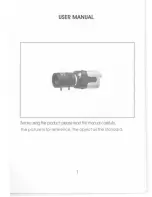
MAIA M2
Quick User Guide
EOPTIS / SAL ENGINEERING
Page 4 of 15
MAIA M2
Rev.1.01 - 07/2019
Copyright © 2016-2019
1
I
NTRODUCTION
MAIA M2 is the low-cost modular multispectral camera, which can be expanded by adding other modules, thus creating
an extremely compact sensors matrix. A very large set of the main multispectral indices can be obtained using only three
modules. MAIA-M2 can also operate autonomously and is the smallest and lightest dual-sensor camera available on the
market. It is ideal for use on aerial and terrestrial vehicles (APR, drones, rover), particularly suitable for manufacturers,
operators and integrators operating in the field of precision agriculture and environmental monitoring.
MAIA is developed in Italy by Eoptis in collaboration with SAL Engineering and Bruno Kessler Foundation.
Each MAIA M2 camera is equipped with two 1.2Mpix CMOS sensors, with global shutter and high sensitivity, which
allow you to acquire stable and sharp images up to 1 shot per second. Each sensor is coupled with a higher quality
bandpass filter, which precisely defines the range of wavelengths of light that will be detected. The user can draw on a
vast portfolio of filters covering the visible (VIS) and near infrared (NIR) region to generate the known agronomic indices
and explore emerging applications. One of the two MAIA-M2 sensors can be in color, thus creating a 4-band camera of
minimum size.
MAIA M2 is able to capture images in free-run mode with fixed shutter frequency of 1fps or in external trigger mode,
based on an electrical signal. To allow an external unit to know the exact moment of tripping, MAIA M2 generates a
strobe synchronism signal that can be used for applications with Post Processed Kinematic (PPK).
The optimal exposure time for each sensor is automatically calculated and the user can select the brightness of the
images on three levels, through the camera button.
Acquisition images and parameters are saved on the MicroSD card in lossless RAW format with depths of 8 or 12 bits
per pixel. The card is removable, but it is also possible to download the images by leaving it inserted and accessing it
through the USB interface.
Two or more MAIA M2 cameras can be connected together to create a sensors matrix, increasing the indices that can
be calculated exponentially. A serial interface and trigger / strobe signals allow you to synchronize the cameras through
the appropriate controller that can be purchased as an accessory, making them operate as a single entity.
The MAIA M2 camera has dimensions of only 34mm x 49mm x 46mm (including lenses and connectors) and weighs only
59g.

































